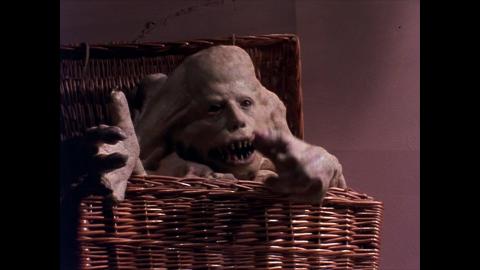Sibling Rivalry and Sexual Rage: BASKET CASE

BASKET CASE
This analysis of Frank Henenlotter's Basket Case was written by Dillon Mitchell, PhD candidate in the Department of Communication Arts at UW Madison. A new 4K restoration of Basket Case will be screened on Friday, October 26 at 7 p.m. at our regular venue, 4070 Vilas Hall. The sreening will be introduced by Katie Trainor, Film Collections Manager at New York’s Museum of Modern Art. Basket Case has been restored by The Museum of Modern Art with support from The Celeste Bartos Fund for Film Preservation.
By Dillon Mitchell
Warning: Contains potential "spoilers."
Our first glimpse of Duane Bradley (Kevin Van Hentenryck), the naïve, plucky protagonist of Frank Henenlotter’s debut film Basket Case, finds him strolling down 42nd Street in New York City past a row of unsavory storefronts with signs selling nude shows and pornographic magazines. He’s approached by a man on the street who rattles through an extensive list of contraband before finally offering some “nice girls” to Duane, who continues walking without a second thought or reaction. When he eventually arrives at a hotel and checks into a room, one of his first encounters with a fellow tenant is witnessing Casey (Beverly Bonner) welcome a john into her room. She gives Duane a wink, eliciting an eye-popping reaction that is almost cartoonish.
Overt sexuality has never been a stranger to the horror film. Flagrant nudity and a penchant for punishing oversexed teenagers are trademarks of the slasher subgenre that was nearing its cultural peak at the time of Basket Case’s release in 1982. Henenlotter has spoken extensively on classifying his movies as exploitation films, rather than horror, and here he is actively working against the trope that sex must be punished. Though the main narrative of Basket Case follows Duane and his monstrous, once conjoined twin Belial (who is brought to life by a combination of puppetry and, in two instances, claymation) seeking revenge on the doctors who forcibly separated them years ago, Basket Case also explores the competitive nature of brothers and Belial’s sexual frustration.
In the course of seeking their revenge, Duane meets Sharon (Terri Susan Smith), the secretary of Dr. Needleman (Lloyd Pace). It’s hard to say that palpable sparks fly between the two considering the acting in Basket Case exists somewhere on the spectrum between The Room and Sleepaway Camp, but a date is set up for the following day. Duane whispers so that his brother, tucked away in his basket across the room, cannot hear. Henenlotter only shoots two aspects of New York City – the landmarks, and the seediest buildings and alleyways he could find, so naturally the idyllic date between Duane and Sharon occurs at the base of the Statue of Liberty. When the two begin to sloppily make out (the bad acting extends to kissing as well), the film cuts to a shot of Belial shooting out of his basket, screaming in a mixture of agony and rage. He wrecks the room before retreating back into his wicker home when the hotel manager forces his way into the room.
It’s made explicit later in the film that Duane and Belial share a telepathic connection from their time spent conjoined. Other than this patently ludicrous and stereotypical aspect though, Basket Case is working through real issues of twindom, like the fear of abandonment and a need for personal space. It just happens to be doing so through a conversation between Duane and Belial in which the latter is set up in a toilet bowl. The brothers’ downfall also ultimately stems from a real issue: Belial’s growing frustrating over his sexual incapacity. Henenlotter doesn’t delve far into Belial’s psychology, but he and Duane seem to share a sort of sexual awakening after they leave their small town in Upstate New York to visit the big city; however, only Duane is able to act on these new feelings.
Belial has two “intimate” encounters with women. In the first, he sneaks into Casey’s room and hides among her pillows, waiting until she goes to sleep to reach out from his hiding place and touch her breast. She is immediately woken up and flees the room in a panic, while Belial sneaks out the window, returning to his basket with a pair of Casey’s underwear in hand. The second occurs after Sharon and Duane’s attempt to have sex in the motel room is spoiled by Belial again bursting out of his basket shrieking with fury.
Duane’s vocal resentment over this is the first time we see him openly chastise Belial for interfering in his brother’s life, and this spurs the monstrosity to further, more spiteful action. As Duane sleeps, Belial slips out the window, his eyes glowing red. The film then cuts between footage of Duane running naked through the streets of New York and shots of him tossing and turning in bed, his body drenched in sweat (no doubt calling forth the imagery of a pubescent boy experiencing a wet dream). The Duane on the streets then finds himself at Sharon’s apartment. When Henenlotter switches to a point-of-view shot coming through her window, we may begin to think that this Duane is in fact Belial; it’s made clear when, after a lengthy POV sequence of “Duane” caressing the woman’s nude, sleeping body, Sharon wakes up and finds herself face-to-face with her beau’s disfigured brother. Belial has simultaneously punished his twin for daring to scold him and beaten him to having sex (in an incredibly twisted way). When Duane arrives and returns his brother to the motel to berate him, Belial picks him up by his crotch, lifting him high into the air and establishing physical dominance in their relationship. Despite his deformity, or perhaps because of it, Belial feels the need to prove his masculinity and sexual potency by any means necessary, ultimately driving him and his brother toward tragedy.
